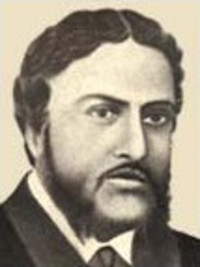Michael Madhusudan Dutt Writer
Michael Madhusudan Dutt, or Michael Madhusudan Dutta (Bengali: মাইকেল মধুসূদন দত্ত (About this sound Maikel Modhushudôn Dôtto ); 25 January 1824 – 29 June 1873) was a popular 19th-century Bengali poet and dramatist. He was born in Sagordari (Bengali: সাগরদাঁড়ি), on the bank of Kopotaksho (Bengali: কপোতাক্ষ) River, a village in Keshabpur Upazila, Jessore District, Bengal Presidency, East Bengal (now in Bangladesh). His father was Rajnarayan Dutt, an eminent lawyer, and his mother was Jahnabi Devi. He was a pioneer of Bengali drama. His famous work Meghnad Bodh Kavya (Bengali: মেঘনাদবধ কাব্য), is a tragic epic. It consists of nine cantos and is exceptional in Bengali literature both in terms of style and content. He also wrote poems about the sorrows and afflictions of love as spoken by women.As a young student, Dutt was influenced by the thoughts and actions of the Young Bengal-a movement by a group of illustrious former students of The Hindu College (now Presidency College) in Calcutta (now Kolkata) against the atrocities, blind beliefs and customs they held as illogical, prevalent in the Hindu society of 19th century Bengal.Dutt, a student of Hindu College himself, aspired to be an English poet and longed to travel to England to gain fame. When his father, concerned by these trends, arranged his marriage, he rebelled. One aspect of his rebellion involved conversion to Christianity.Dutt is widely considered to be one of the greatest poets in Bengali literature and the father of the Bengali sonnet. He pioneered what came to be called amitrakshar chhanda (blank verse). Dutt died in Calcutta, Bengal Presidency on 29 June 1873.Although his first love remained poetry, Michael Madhusudan Dutt, or Madhu- as he was called affectionately,showed prodogious skill as a playwright. He was the first to write Bengali plays in the English style, segregating the play into acts and scenes. He was also the pioneer of the first satirical plays in Bengali - "Buro Salik er Ghare Row" and "Ekei Ki Bole Sovyota?" (Is this what we call Civilisation?". When Deenabandhu Mitra wrote a Bengali play portraying the plight of the workers in indigo plantatiobs at the hands of their British masters, Dutt was the person who translated the play into English. Rumour has it that he translated the entire play in a single night. There is no proof that Dutt had translated the play, however,as- on account of fear of prosecution by the British Government of India- neither the writer's nor the translator's name was printed when the play was published in English. After this episode Dutt went back to writing mainly poetry-occasionally writing short pieces of prose. He had also translated the episode of Prince Hector's death from Homer's Illiad into Bengali. Although Dutt was a literateur par excellence, he was an alchoholic from his youth and his addiction grew as he aged. It was the source and cause of many of his hardships and miseries-both financial and mental. He was supported in his times of financial crisis by his friends and Sri Ishwarchandra Vidyasagar; the latter sent him monthly allowances regularly on the condition that Dutt should concentrate all his efforts in creating great specimens of Bengali poetry. Dutt was, however, never able to master his addiction and it led to his untimely death. He had married twice.Michael Madhusudan Dutt was an important figure of the Bengali Renaissance who helped place Bengali literature on the throne it holds at present. He was hailed as the greatest poet of the Bengali language until the advent of Rabindranath Tagore. Even now, he is one of the great poets of the Bengali language.
